Justice Athar Minallah’s Concerns
Justice Athar Minallah questioned, “Did the Election Commission itself commit this serious violation of the constitution? Should the court validate unconstitutional interpretations by a constitutional body? Do you want us to revive the Doctrine of Necessity?”
Justice Mansoor Ali Shah emphasized, “This is not a mere land dispute case. The judiciary has complete authority to ensure justice is served.”
Supreme Court Full Bench Hearing
The Chief Justice Qazi Faez Isa and Justices Syed Mansoor Ali Shah, Muneeb Akhtar, Yahya Afridi, Aminuddin Khan, Jamal Khan Mandokhail, Muhammad Ali Mazhar, Ayesha Malik, ISLAMABAD: Chief Justice Qazi Faez Isa, hearing the Sunni Ittehad Council’s case on reserved seats, stated that the nation must now follow the constitution and that the Supreme Court’s verdicts, along with Chief Justice Athar’s judgments, are based on law and justice., Syed Hasan Azhar Rizvi, Shahid Waheed, Irfan Saadat Khan, and Naeem Akhtar Afghan comprised the 13-member full-court bench that heard the case. The attorney general started his arguments by stating that they requested records about reserved seat allocations in the 2018 elections and that the authorities excluded independent candidates when determining those seats.
Discussion on Election Commission’s Actions
Justice Athar Minallah questioned the Attorney General, “You haven’t answered the fundamental question. A political party was excluded from the elections by the Election Commission. When the Election Commission commits unconstitutional acts, isn’t it the judiciary’s responsibility to rectify it?”
Attorney General Mansoor Awan replied that he would address this question in his concluding arguments. Justice Mansoor Ali Shah noted that no one had ever brought the issue of independent members to court before, and the significantly high number of independent members this time brought this case to the fore.
Parliamentary System and Independent Candidates
Justice Muneeb Akhtar highlighted, “The parliamentary system is based on political parties. The current dispute arose due to the Election Commission’s errors. Where did this large number of independent candidates come from? Did people choose them as independents, or did the Election Commission declare them independent?”
Article 51 and Parliamentary Party Status
Justice Jamal Mandokhail pointed out that Article 51 mentions seats, not membership. Justice Muneeb Akhtar explained that Article 224 provides that no assembly seat should be left vacant. The Chief Justice stated, “We haven’t heard any party say that seats should remain vacant; everyone claims the seats should be theirs.”
Attorney General mentioned that Faisal Siddiqui argued that if Sunni Ittehad Council doesn’t get seats, they should remain vacant. For a parliamentary party, it is essential that a political party has won seats in the elections.
Justice Ayesha Malik questioned whether the Sunni Ittehad Council is currently a parliamentary party. Chief Justice Isa remarked, “What difference does it make whether they are a parliamentary party or not?” Justice Ayesha Malik responded, “How can the recognition of a party as a parliamentary party not make a difference?”
Notification and Legal Implications
Justice Mansoor Ali Shah asked if the Election Commission had declared the Sunni Ittehad Council as a parliamentary party. The Attorney General replied that he was unaware of this. Justice Mansoor Ali Shah asked for an explanation of how the notification declaring the Sunni Ittehad Council as a parliamentary party came about.
The Attorney General stated that independent candidates cannot form a parliamentary party; they must join a party that has won at least one seat. Chief Justice Isa questioned the validity of the notification, asking how a letter from the Deputy Registrar could be considered the Supreme Court’s position.
Final Arguments and Adjournment
Justice Muneeb Akhtar noted that official communication cannot be ignored. Justice Jamal Mandokhail asked under which law the Election Commission issued these notifications. The Attorney General replied that these notifications are not related to Article 63A. Quoting Allama Iqbal, the Attorney General recited a verse from “Bang-e-Dra.” Justice Jamal Mandokhail responded, “If we accept your interpretation, many parliament members will lack a parliamentary leader, and we cannot enforce Article 63A.
Chief Justice Muneeb Akhtar emphasized that the Election Commission’s records recognize the Sunni Ittehad Council as a parliamentary party, questioning how the Election Commission could deprive them of seats.
Justice Athar Minallah reiterated that it is proven that the Election Commission misinterpreted the court’s decision. The judiciary’s role is to correct such errors, not to validate unconstitutional acts. The Chief Justice said that the Supreme Court’s decisions are based on justice and adherence to the Constitution.
After the Attorney General’s arguments were concluded. The Sunni Ittehad Council’s lawyer requested that his rebuttal be completed in 15 minutes. The Supreme Court then adjourned the hearing on the reserved seats case until July 9.


